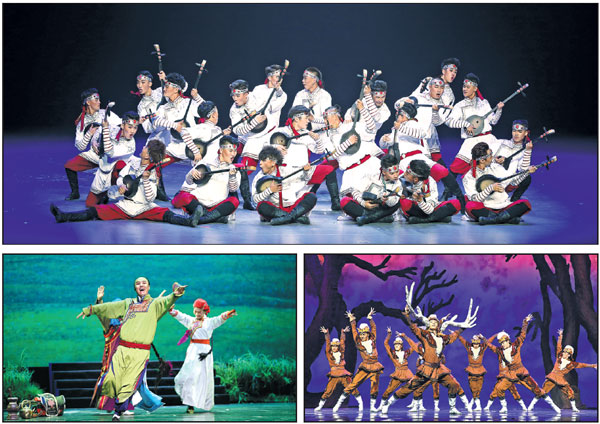Wider view
By Yang Yang and Yuan Hui (China Daily) Updated: 2017-04-10 07:22Theater from Inner Mongolia tours the Americas, but some urge greater marketing support for overseas visits. Yang Yang and Yuan Hui reports.
Uljit recently returned from a tour of the Americas.
To celebrate Spring Festival in February this year, 22 performers of the Inner Mongolia Art Theater went on a 25-day visit, presenting cultural shows to people in that part of the world.
Uljit, the 60-year-old deputy director of the theater, is also good at singing and dancing.
|
The Inner Mongolia Art Theater thrills audiences at home and abroad with ethnic dancing and singing, Peking Opera, chorus and acrobatics performances. Photos Provided to China Daily |
During the tour, he hosted several galas in Texas, Arkansas and Oklahoma in the United States and other cities in South America, where the Chinese artists performed Mongolian-style songs, folk dance, acrobatics, khoomei (throat-singing) and played traditional instruments like the morin khuur (horse-head fiddle).
The tour, sponsored by the Chinese government, drew viewers from among Chinese and other communities living there.
Uljit, who started going on such tours in 1979, says he has been thinking about how to further explore the market for performances overseas.
His answer: effective marketing.
"I saw audiences lining up for tickets in Vienna to watch our performance," he says of a different tour last year.
"We sent our top artists on the tours. Audiences in Europe and the Americas loved our performances.
"Although making profit is not our purpose, with proper marketing, we can take our brilliant culture to more people abroad," he adds.
The foreign audience's acknowledgment of Chinese culture will boost the theater's confidence in telling more Chinese stories to the world, Uljit says.
During their tour in Oklahoma this year, team members went to watch a game of the US National Basketball Association, and the marketing there amazed Uljit.
"On that afternoon, when we visited the stadium, it seemed almost deserted, but by evening, it was full of people. I was surprised to see how good their marketing was.
"There were few local viewers. Many members of the audience flew to the game in their private jets from all over the world," he says.
"We have given so many performances and judging from the 'bravos' we received, we should try to sell our performances better," he says.
Citing the example of an acrobatics show by the theater which features five girls on unicycles with bowls on top of their heads, he says the act has won top international awards.
Although the government has given financial support, "we still want to have a try in the market, like Shaolin kung fu", Uljit says.
Founded in 2013, the Inner Mongolia Art Theater is a nonprofit cultural institution, supported by government aid.
The Inner Mongolia autonomous region, located in North China, is famous for its beautiful grasslands, horse raising and Genghis Khan stories.
The theater has a total of 981 people from different ethnic groups - Mongolian, Han, Hui, Korean and Daur - working in the theater's nine art centers and five administrative departments, with the majority of Mongol ethnicity.
Each year, the theater presents performances of Peking Opera, local traditional opera, folk music, chorus and acrobatics.
However, exploring the overseas market is never easy, says Zhang Xiaorui, the senior manager of international programs with Wu Promotion, a company with long experience of promoting cultural exchanges between the East and the West.
"We want to promote performances that are created by international teams, or with an international perspective, such as Kun Opera's Peony Pavilion that has been constantly reproduced to cater to the taste of young people, or Peking Opera's Faust, co-produced by artists from China, Germany and Italy," she says.
Some performances from ethnic groups like Mongolians or Uyghurs are appealing to foreign audiences, but their presentations need more marketing support on overseas tours.
People in other countries also know very little about the languages and their cultures, so it is sometimes hard for them to understand the performances, Zhang adds.
"We need to arrange lectures before such performances and provide good translation for them. We also have to give the audience time to ask questions," she says.
"To go international, they also have to have a good team to do the publicity for their shows, provide high-definition pictures and attractive introductions."
Contact the writer at yangyangs@chinadaily.com.cn
- 'Cooperation is complementary'
- Worldwide manhunt nets 50th fugitive
- China-Japan meet seeks cooperation
- Agency ensuring natural gas supply
- Global manhunt sees China catch its 50th fugitive
- Call for 'Red Boat Spirit' a noble goal, official says
- China 'open to world' of foreign talent
- Free trade studies agreed on as Li meets with Canadian PM Trudeau
- Emojis on austerity rules from top anti-graft authority go viral
- Xi: All aboard internet express












